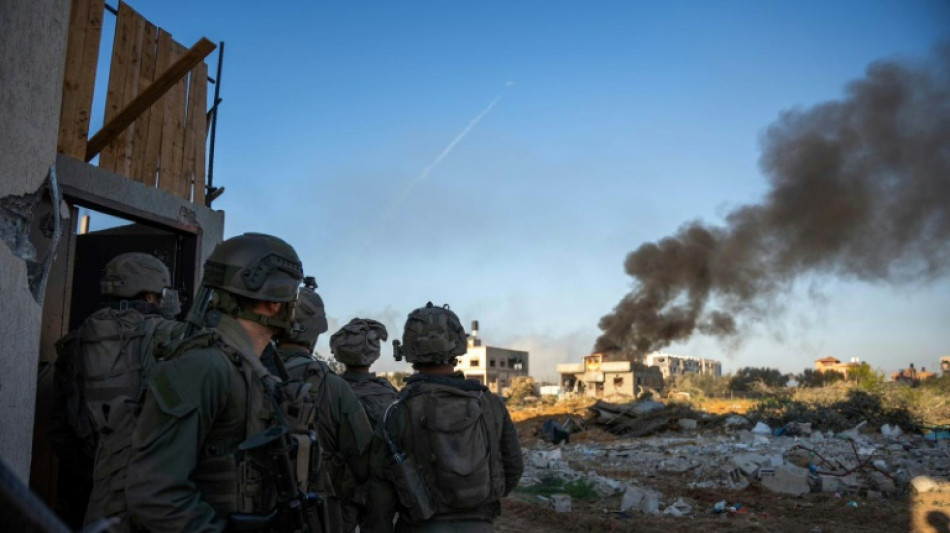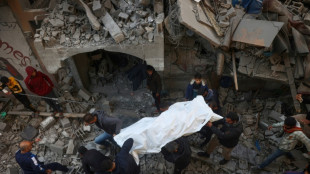

Fighting inches closer to hospitals in Gaza's Khan Yunis
Heavy fighting drew near to hospitals in Gaza's Khan Yunis on Wednesday after Israel said it had intensified its assault on the city that has become the focus of its war with Hamas.
The United Nations raised fears about the fate of thousands of internally displaced people sheltering -- and now trapped -- on the grounds of the hospitals in southern Gaza's biggest city.
The Israeli army says it has "encircled" Khan Yunis, the birthplace of Hamas's Gaza chief Yahya Sinwar, accused of being the mastermind of the October 7 attacks that sparked the war.
"Heavy fighting is reported in proximity to hospitals in Khan Yunis, including Al-Aqsa, Nasser and Al-Amal, with reports of Palestinians trying to flee to the southern town of Rafah," the UN humanitarian agency OCHA said.
"No-one can enter or exit (Nasser Hospital) due to ongoing bombardments," OCHA said citing medics who also reported that staff were digging graves on the grounds of the facility "due to the large numbers of fatalities anticipated".
OCHA said about 18,000 people uprooted from their homes were reported to be at Nasser Hospital alone.
An AFP journalist saw Palestinians who fled Khan Yunis arriving in Rafah on the backs of pick-up trucks along with their belongings.
Gaza hospitals had already received the bodies of at least 125 people killed overnight, the health ministry in the Hamas-run territory said.
"Dozens of Israeli tanks are surrounding Nasser Hospital from all sides, except for a corridor for displaced people to leave," the Hamas government said.
- 'Buffer zone' -
The Gaza war began with Hamas's unprecedented October 7 attacks, which resulted in the deaths of about 1,140 people in Israel, mostly civilians, according to an AFP tally based on Israeli official figures.
In response, Israel has carried out a relentless military offensive that has killed at least 25,700 people in Gaza, about 70 percent of them women and children, according to the health ministry in the Hamas-run territory.
The government of Prime Minister Benjamin Netanyahu has come under mounting pressure from the Israeli public to end the war.
That pressure has mounted after 24 soldiers were killed Monday in the army's deadliest single day since it launched ground operations in Gaza.
The military said 21 of them were reservists killed "when a squad of terrorists surprised the force" with rocket-propelled grenade fire.
Israeli army chief Herzi Halevi said "they fell in battle near the border fence during a defensive operation in the area separating the Israeli communities from Gaza".
Citing Israeli officials, The New York Times said the operation was to demolish part of a Palestinian neighbourhood as part of a plan to create a "buffer zone" inside Gaza along the Israeli border.
UN chief Guterres, meanwhile, decried Israeli officials' repeated rejection of calls for the creation of a Palestinian state as "unacceptable", saying it "would indefinitely prolong" the conflict.
The World Food Programme warned conditions in the territory were worsening.
"More than half a million people in Gaza are facing catastrophic food insecurity levels and the risk of famine increases each day," said the WFP's senior Middle East spokeswoman, Abeer Etefa.
- 'Nothing to eat' -
In Gaza City, people displaced by the war said they were stuck in a new conflict zone without provisions.
"They besieged us in the camp and brought us here, and even here, the shelling continued," Umm Dahud al-Kafarna, originally from Beit Hanun, told AFPTV.
"They have besieged us for six days, leaving us with nothing to eat or drink while bombing us from the air, sea and tanks."
US President Joe Biden's Middle East envoy Brett McGurk is in the region for talks aimed at brokering a new deal to free the remaining captives in exchange for a pause in fighting.
"Certainly one of the things he's in the region talking about is the potential for another hostage deal, which would require a humanitarian pause of some length," National Security Council spokesman John Kirby said.
"The conversations are very sober and serious about trying to get another hostage deal."
A Palestinian source familiar with the talks said a Hamas delegation had arrived in Cairo on Tuesday to meet Egypt's intelligence chief and discuss new ceasefire proposals.
A source close to Hamas told AFP that the talks in the Egyptian capital were continuing on Wednesday.
- Wider escalation -
The Gaza war has spurred fears of a wider escalation, with a surge in violence involving Iran-backed Hamas allies across the Middle East.
The US military said it carried out strikes on Iran-backed groups in both Iraq and Yemen overnight.
A spokesman for Iraqi Prime Minister Mohamed Shia al-Sudani sharply criticised the United States over the strikes.
"This unacceptable act" was contributing to "a reckless escalation... at a time when the region is already grappling with the danger of an expanding conflict," said Yehia Rasool, the Iraqi leader's spokesman for military affairs.
It was the latest in a series of strikes by the United States and Britain aimed at reducing the Huthis' ability to target shipping, which they have done since November in support of Palestinians in Gaza.
burs-dv/kir
L.Amato--IM




